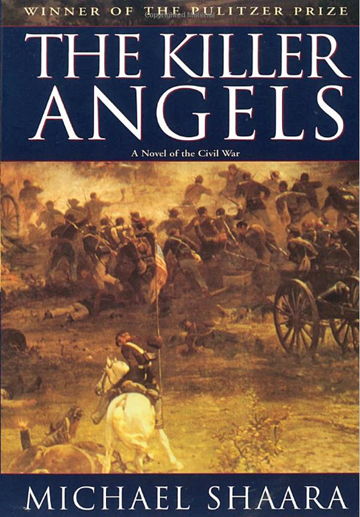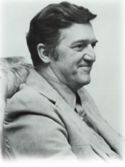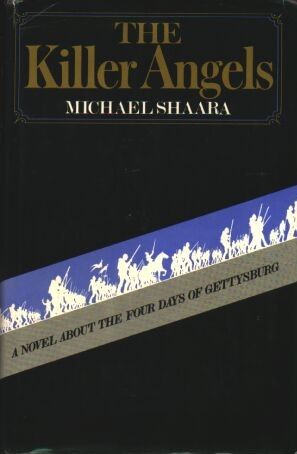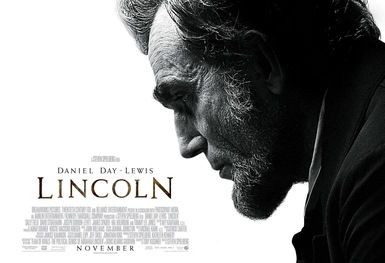Hallowed Ground: Gettysburg's Theta Chi Connection (Part III)

Part 1 explored the men involved in the Battle of Gettysburg, and yesterday, Part 2 discussed Delta Omicron Chapter and other links to the Borough of Gettysburg. Today, Part 3 will share how Theta Chi members have perpetuated the legacy and lessons of Gettysburg to literally millions - through written word and film.
Brothers from Alpha Chapter and Delta Omicron Chapter forged connections to Gettysburg - though their connections are fairly obvious. Several other brothers from other chapters have visited Gettysburg and have been profoundly touched and influenced to the point that they were compelled to share the stories of Gettysburg in written word and on film.
One member shared a tie between Theta Chi and Gettysburg in the Spring of 2002, when his photo of the Pennsylvania Monument from the Gettysburg Battlefield was featured on the cover of The Rattle. Theta Chi brothers and Civil War reenactors Samuel D. Prestipino, Iota Alpha/UNC-Wilmington 2002, and his father, alumnus initiate Samuel P Prestipino, Iota Alpha/UNC-Wilmington 1999, visited Gettysburg and have participated in various reenactments. Sam Jr., a Charter Member of Iota Alpha Chapter, shared a story entitled "Guard Duty-For the Name of Theta Chi" in which he described his passion for reenactments and its historical connection to those brothers that fought and died in the Civil War. Whenever possible, Sam would button only the top 3 buttons of his uniform jacket to honor Theta Chi Founders, Frederick Norton Freeman and Arthur Chase and Assistant Founder, Egbert Phelps. Sam’s article also included Theta Chi’s first listing of brothers that served in the Civil War, along with their units and involvement. Sam provided many quality photos with his article, but it was his picture from Gettysburg that made the cover.

The next tie to Gettysburg may not be as obvious, though many are highly familiar with this work. In 1974, David McKay Publications released the novel The Killer Angels by author Michael Shaara, Beta Delta/Rutgers 1951. Shaara had previously written some science fiction and had been teaching at Florida State University. He developed a character driven narrative regarding the events of the Battle of Gettysburg, telling the events from the point of view of the officers and men that were involved in the battle. Shaara wove a tale of two armies and the probable emotions felt by those in charge as they made life and death decisions. His work provided lessons in leadership and readers saw the causes of the Civil War based on the perspectives of the characters as history played out on the battlefields of Gettysburg. Shaara created additional drama with the true stories of friends trying to cope with the reality of meeting as enemies on opposing sides. The Killer Angels was awarded the 1975 Pulitzer Prize for Fiction, and has been so respected and appreciated that it has been required reading at different times at some of the nations most prominent military schools, including the United States Military Academy at West Point.

Though Shaara unfortunately passed away from a heart attack in 1988, his legacy continued when his novel became the basis for the screenplay written by Ronald F. Maxwell about the Battle of Gettysburg. Maxwell pitched the idea to several outlets, and eventually secured the support of Ted Turner, who planned to air the miniseries on his network, TNT. Maxwell secured access from the National Park Service to film several key scenes on the actual battlefield. Adding to the authenticity were the thousands of volunteer Civil War reenactors who traveled to Gettysburg, lived in tents, to participate and assist with several major battle scenes. The filmmakers secured actors Tom Berenger and Martin Sheen to portray General James Longstreet and General Robert E. Lee, Jeff Daniels as Union Col. Joshua Lawrence Chamberlain, Sam Elliot as Union General John Buford, and Stephen Lang as the tragic Confederate General, George Pickett. Ted Turner participated in the filming of a scene for Pickett’s Charge, and became so impressed with the quality of the performers and the film that he made the decision to release the film in theaters with a later release on his TNT cable network.
Released in 1993, this film based on Shaara’s work, with major portions of dialogue taken directly from the novel, was later re-titled Gettysburg and received mostly positive reviews from critics. Gettysburg has become essential viewing in history classrooms across the country, and remains a favorite film to Civil War enthusiasts, historians, and many others.
Shaara’s son, Jeffrey Shaara, picked up where his father left off, and authored several of his own novels, including a prequel and sequel to The Killer Angels titled Gods and Generals and The Last Full Measure. He also sought to honor his father’s legacy and started the Michael Shaara Prize for Excellence in Civil War Fiction, an annual literary award to the writer of a work of fiction related to the American Civil War. Since 2004, the award has been presented at the Civil War Institute at Gettysburg College.

In 2012, another film was released that had a tie to Gettysburg, primarily through a figure that made his mark on the town after the battle. Lincoln, directed by Steven Spielberg, Zeta Epsilon/Long Beach State 1969, starred Daniel Day-Lewis and was based on the book Team of Rivals: The Political Genius of Abraham Lincoln by Doris Kearns Goodwin. While the majority of the film dealt with Lincoln’s strategy and tactics to help politic Congress into passing the 13th Amendment abolishing slavery, the opening scene of the film mentions Gettysburg and the dedication of the cemetery and also depicts several Union soldiers reciting the Gettysburg Address back to Lincoln.
Lincoln premiered on October 8, 2012 at the New York Film Festival and was then released theatrically: first on November 9 in select cities, and then a wide release on November 16. Though Spielberg was busy touring and promoting the film, he made time to accept a very special invitation.
Since 1938, the Lincoln Fellowship, in association with the Gettysburg National Park Service, Gettysburg College, and the Gettysburg Foundation has hosted Dedication Day on November 19th to commemorate the anniversary of the dedication of the National Cemetery and Lincoln’s Gettysburg Address. Over the years, politicians, journalists, judges, historians, novelists, sculptors, and actors have been tapped to provide remarks at a rostrum in Gettysburg National Cemetery, not far from where Lincoln delivered his speech. In 2012, Steven Spielberg was selected as the keynote speaker for the event, and on the morning of November 19, he shared his thoughts with the crowd of over 9,000 visitors.
Spielberg remarked how humble he felt to be speaking at this occasion and at this particular location and noted that he believed the Gettysburg Address to be the "the most perfect prose poem ever penned by an American" He further stated:
"Gettysburg, of course, is a battlefield, and a cemetery in which the soldiers who died in service of our country are buried. Their sacrifice of nearly a hundred and fifty years ago was so complete, and so completely essential, that time, as Lincoln predicted, hasn’t managed to erase it from memory. The name of this place still resonates with a shuddering in the hearts of the American people. More than any other name connected to the Civil War except Lincoln’s, Gettysburg reverberates. Americans retain the knowledge that what happened here was the crux of our terrible national trial. Even Americans who aren’t sure precisely what transpired on these fields know that all the glory and all the tragedy we associate with the Civil War resides most palpably, most indelibly here.
The reason for this concentration of heartbreak and heroism in a geographical location is simple, and Lincoln told us what it was, that day, when he found his best and truest voice:
It’s the courage, the selflessness, the strength, endurance, heroism and sacrifice of the patriots who are buried here -most of them were terribly young men, men no older than my sons; it’s the memory of those honored dead, those in their graves and those who have never been found, that brings all of America, always, back to Gettysburg.
And it’s in the face of their courage and sacrifice, and the courage displayed and the sacrifices made in war after war since those July days in 1863, to this very day, by the men and women of the Armed Forces of the United States, that I feel the deepest humility, which is only another way of saying the very deepest gratitude – to the citizen-soldiers of the United States.
The citizen-soldiers who battled here were defending something other than boundaries, territory or property, something other than religious belief, cultural tradition and national identity. Lincoln contends that they gave the last full measure of devotion to defend a proposition about government, about how we choose to live together, starting with liberty and moving to equality, and whether the contract we make with one another, based on liberty and equality, is practical, whether it will work, mechanically work, whether this idea of government can function on the earth we inhabit – that’s one reason why, I think, he keeps saying "here" in the address – Here! It happened right here, on the ground all of you are standing on, on the solid earth we all inhabit.
The citizen-soldiers fighting for the Union died testing the proposition that democracy can work in the hands, not of angels, nor even, to borrow from Lincoln’s first inaugural address, in the hands of the better angels of our nature, but in the sometimes clumsy, sometimes bloody, error-prone hands of the ordinary people we are. On this sacred testing-and-proving ground, people willingly died to prove that people live together better if they refuse to oppress one another -to prove, in other words, that democracy works."
Spielberg thanked Doris Kearns Goodwin, author of Team of Rivals, as well as historians Harold Holzer and James McPherson who served as historical consultants on the film and provided a personal tour of the battlefield. In closing he said that "Lincoln suggested, here at Gettysburg,…that trying to grasp the meaning of our existence is the great task always before us…To try to comprehend the point of our struggles and our suffering, our defeats, our triumphs – the search for the meaning of our lives and of our deaths is the highest function of our capacities to reason, to remember, to imagine, and to dream."
Click to watch Spielberg's complete remarks from 2012's Dedication Day. Video courtesy of filmaker Jake Boritt. Check out Boritt's latest project, The Gettysburg Story.
Spielberg’s work on Lincoln was recognized with a nomination for an Academy Award for Best Director. All told, Lincoln was nominated for seven Golden Globes, winning Best Actor and received 12 nominations for Academy Awards, including Best Picture, and won for Best Actor and Best Production Design. Abraham Lincoln and his "few appropriate remarks" are forever tied to Gettysburg and Spielberg’s creativity and attention to detail brought the 16th President of the United States to life.
Theta Chi Fraternity and Gettysburg are forever linked. For more than 150 years, members have had a connection to some of the most hallowed ground in our country. Maj. Josiah Hall charged through Hanover, PA on June 30, 1863 participating in the first battle of the Civil War that took place on completely free soil. On July 1-3, 1863, Theta Chi Fraternity was present at Gettysburg on nearly every main section of the battlefield. On July 1-3, members of Theta Chi Fraternity performed gallantly. Our members and their units and comrades are marked for all time with tributes, statues and memorials throughout the battlefield. For more than 50 years, the College located in the town hosted our Delta Omicron Chapter, which utilized portions of the battlefield to prescribe the oaths to men joining our brotherhood. The former Delta Omicron Chapter Adviser has his final resting place in Gettysburg’s National Cemetery, dedicated by President Lincoln’s "few appropriate remarks" on November 19, 1863. Those remarks were later used by Steven Spielberg decades later in the opening scenes of his film Lincoln. The story and legacy of Gettysburg and the inspiration of countless writers and historians continues to live through the work of Brother Michael Shaara and his novel, The Killer Angels. Countless students and others have learned about the battle when his novel became the basis for the film Gettysburg. Even 139 years later, Gettysburg ends up on the cover of the Fraternity magazine.
No matter how hard we try, Theta Chi Fraternity cannot separate itself from Gettysburg. It is highly plausible that the Fraternity could have survived had its members not served at Gettysburg in 1863, however, it is difficult to say whether or not the Union would have survived if some of our members had not been in the battle. Could the absence of the actions of our brothers that served have potentially shifted the battle in the other direction? Had Maj. Josiah Hall not been there to help the 1st Vermont Cavalry drive Gen. J.E.B. Stuart out of Hanover, would the Confederate Cavalry have reached Gettysburg and Lee earlier, changing the course of the entire battle? We may never know how much Lt. Frederick Galbraith assisted Maj. Gen. Howard throughout the battle, but would Gen. Howard have been able to maneuver his XI Corps without Galbraith’s help? What if Williston and Hutchinson’s units had not been there in reserve and what if they were needed? These brothers stood ready to enter the Battle at a moment’s notice. Finally, what if Randall’s 13th Vermont had not re-taken that cannon on July 2 – how many Union lives were saved by reclaiming that artillery? Would the Union still have repulsed Pickett’s Charge if not for Randall’s regiment’s flanking movement on July 3? How many Confederate lives did Randall save during that onslaught by running in front of his own men to order them to cease fire?
How many lives were changed for the better because of the men that joined Delta Omicron Chapter? What if the brothers had not been there to help clean up the battlefield? What if they had never initiated Dr. Bugbee?
The coincidences and ties between Gettysburg and Theta Chi even after the end of the battle seem limitless. A future Congressmen for the Gettysburg area was present at the Delta Omicron Installation? An alumnus member initiated during the installation of Beta Lambda at Akron becomes the President of Gettysburg College nearly a decade after Delta Omicron chapter is installed? It is difficult to fathom works of fiction that would be this creative! The fact that I’ve written this article for Theta Chi Fraternity about my hometown more than 150 years after the Battle of Gettysburg is just one more to add to the growing list of these coincidences.
There are still additional Theta Chi related questions: Was Michael Shaara thinking back to his time at Rutgers and Beta Delta Chapter when he wrote parts of The Killer Angels? Did Theta Chi have an impact on the topics of leadership and brotherhood found in that novel? Would Spielberg have become as successful as he has become and made a film about Lincoln if not for some of his brothers at Zeta Epsilon Chapter who helped him with some of his early films while at Long Beach State? This is all totally unknown. We may never know the answers.
But within all of these questions and speculation, at least in my opinion, lies a lesson of Gettysburg. And a lesson of Theta Chi. Sometimes it does take only one. The power of one is immense, but often brief because a leader finds followers. Sometimes, so much more can be accomplished by standing up together, standing up for each other, helping each other. Victory at Gettysburg was never secured alone – there was always someone else – another soldier, another unit, another commander, another reserve. The soldier is nothing without his rifle and his supplies. Theta Chi is nothing without friendship and accountability to each other. The success of Theta Chi over the years has never been about the individual. It is the unified brotherhood. Nothing is done alone – there is always someone else along the way that helped. Freeman had Chase in 1856. In 1881, James Michael Holland had the support of local alumni. That is the point of our organization: we can do more by being unified together than we could ever accomplish on our own – and that our motto is that we help each other. The Assisting Hand marches on.
Lincoln would make similar points in his address – America was a new nation, conceived in liberty dedicated to the proposition that all men are created equal. Lincoln reminded us that America was not a kingdom ruled by one – that our fate, our legacy is determined by how we assist each other and how we hold ourselves accountable - "That government of the people, by the people, for the people would not perish from the earth."
The united dream and vision of two young cadets at a military school in Vermont in 1856 are forever linked to the events in a little town invaded by two warring armies with divided and differing dreams and visions. And, the little town that saw the best and worst in mankind on those three days in 1863 has been forever affected by the legacy created by those two young cadets. Indeed, Gettysburg has impacted and shaped America. And Theta Chi Fraternity has impacted and shaped the hallowed ground of Gettysburg.



